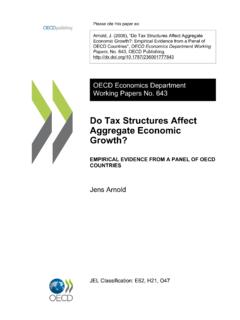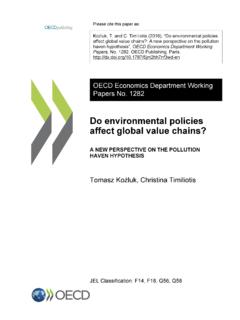Transcription of DECOUPLING OF WAGES FROM PRODUCTIVITY - …
1 DECOUPLING OF WAGES FROM PRODUCTIVITYS pecialChapterof OECD EconomicOutlook21 November20182 PRODUCTIVITY gains no longer translate into broadly shared wage gainsNote: Employment weighted average of 24 countries (two-year moving averages ending in the indicated years). 1995-2013 for Finland, Germany, Japan, Korea, United States; 1995-2012 for France, Italy, Sweden; 1996-2013 for Austria, Belgium; United Kingdom; 1996-2012 for Australia, Spain; 1997-2013 for Czech Republic, Denmark, Hungary; 1997-2012 for Poland; 1998-2010 for Netherlands; 1998-2013 forNorway; 1998-2012 for Canada, New Zealand; 1999-2013 for Ireland; 2002-2011 for Israel; 2003-2013 for Slovak Republic.
2 All series are deflated by the value added price index excluding the primary, housing and non-market sectors. Source: OECD economic Outlook November 1995 = 100 Labour productivityAverage wagesMedian wagesContribution of declining labour shareContribution of increased wage inequality3 Large heterogeneity in DECOUPLING across countriesSource: OECD economic Outlook November 2018 RepublicCanadaNetherlandsAustraliaIsrael IrelandUnited KingdomDenmarkSwedenCzech RepublicNew ZealandGermanyAustriaNorwayTotaldecoupli ngLabour shareWage inequalityAnnualised growth rates in %;excluding primary, housing and non-market industries.
3 1995-20144 Superstar firms or the rest?Labour PRODUCTIVITY and real WAGES (2001 = 100)Panel A: Countries with declines in labour sharesPanel B: Countries with increases in labour shares9010011012013014015016020012003200 5200720092011201320012003200520072009201 12013 Note: Labour PRODUCTIVITY and real WAGES are computed as the unweighted mean across firms of real value added per worker and reallabour compensation per worker. Leaders are defined as the top 5% of firms in terms of labour PRODUCTIVITY within each country group in each industry and year.
4 The countries with a decline in the labour share excluding the primary, housing, financial and non-market industries over the period 2001-2013 are: Belgium, Denmark, Germany, Ireland, Japan, Korea, Sweden, United Kingdom and United States. The countries with an increase are: Austria, Czech Republic, Estonia, Finland, France,Italy, Netherlands and : OECD economic Outlook November wage dispersion has increased90-10 percentile ratio (2001=100)Note: The solid and dashed lines are based on the estimated year dummies of a regression of, respectively, log- PRODUCTIVITY and wagedispersion across firms within country-sector pairs in the following countries.
5 Australia, Austria, Belgium, Chile, Denmark, Finland, France, Hungary, Italy, Japan,Netherlands, New Zealand, Norway, and Sweden. The dotted line is based on the year dummy estimates of a regression of the worker-level wage dispersion from the OECD Earnings Distribution database within each country (Australia, Finland, France, Hungary, Italy, Japan, Netherlands, New Zealand, Norway, and Sweden). Source: Berlingieri, Blanchenayand Criscuolo(2017) and authors wage dispersionBetween-firm wage dispersionBetween-firm labour PRODUCTIVITY dispersion6 Structural and policy drivers of decoupling1.
6 Based on Schwellnus etal. (2018) and Pak and Schwellnus (2018).2. Based on De Serresand Schwellnus (2018) and Berlingieri, Blanchenayand Criscuolo(2017).Note: indicates statistical insignificance and ? indicates that drivers have not been subject to robust empirical analysis in the context of the studies reviewed in this chapter. 7 High skillsreducecapital-labour substitution evenin high-routine industriesNote: Basedon the industry-levelresultsfor numeracyskillsreportedin Schwellnuset al. (2018).Source: Schwellnus etal. (2018)Change in the labour sharein responseto a 10% decreasein the relative investmentprice.
7 % points8 SummarySome DECOUPLING on average but significant cross-country declines in relative investment prices and increased global value chain participation partly explain the DECOUPLING of wage growth from PRODUCTIVITY policies and institutions that affect the scope for capital-laboursubstitution as well as the size and the distribution of producer rents can help explain large differences in DECOUPLING across declines have been particularly pronounced at the technological frontier and wage dispersion between firms has increased, which may reflect technology- and globalisation-induced winner-takes-most :De Serres, A.
8 And C. Schwellnus(2018), A generalequilibrium(LM and PM reforms) perspective to inequality , in Astarita, C. and G. D Adamo (eds.), Inequalityand Structural Reforms: MethodologicalConcernsand LessonsfromPolicy. Workshop Proceedings, EuropeanEconomyDiscussion PapersNo. 71, EuropeanCommission, , C., A. Kappeler and P. Pionnier(2017), DECOUPLING of WAGES from PRODUCTIVITY : Macro-level facts , OECD Economics department working Papers, No. 1373, OECD Publishing, , C., A. Kappeler and P. Pionnier(2017), The DECOUPLING of Median WAGES from PRODUCTIVITY in OECD Countries ,International PRODUCTIVITY Monitor, Vol.
9 And firm-level evidence:Berlingieri, G., P. Blanchenayand C. Criscuolo(2017), The great divergence(s) , OECD Science, Technology and Industry Policy Papers, No. 39, OECD Publishing, , M. and C. Schwellnus(2018), Labourshare developments over the past two decades: The role of public policies , OECD Economics department working Papers, OECD Publishing, , C., et al. (2018), Labourshare developments over the past two decades: The role of technological progress, globalisationand winner-takes-most dynamics , OECD Economics department working Papers, No.
10 1503, OECD Publishing.













